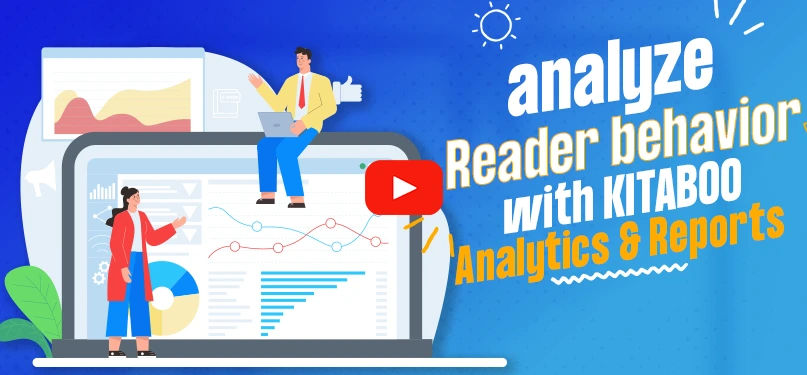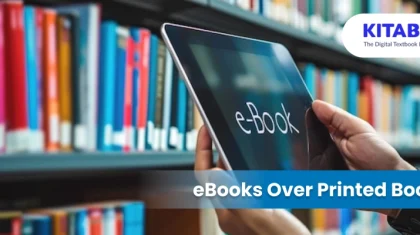
Free vs. Fee: Demystifying Online Book Publishing Platforms
Summarize this blog with your favorite AI:
As the demand for eBooks increases, publishers are exploring new ways to optimize the publishing workflow and create quality products. By the end of 2024, the eBook market worldwide is expected to generate a revenue of $14.61 billion and $15.33 billion by 2027. The collective user base of eBook consumers is expected to hit $1.1 billion by 2027.
These staggering numbers are nudging publishers to seek out a more collaborative, intuitive, and cost-effective publishing experience that enables the creation of interactive, engaging eBook products.
Today, publishers can choose from a wide range of online book publishing platforms for their needs. For instance, the digital textbook publishing platform KITABOO is leveraged by education publishers to produce highly interactive educational content. However, for a large number of publishers, choosing the right publishing tool can be an overwhelming experience.
In this blog post, we demystify book publishing platforms and offer guidance to publishers on choosing the right one.
Table of Contents:
I. What are Online Book Publishing Platforms?
II. Should you Choose a Free Digital Book Publishing Platform?
III. Advantages of Innovative Digital Book Publishing Platforms
- Seamlessly Publish Interactive eBooks
- Leverage Cloud Capabilities
- Compatibility With Multiple Devices And Operating Systems
- Produce Accessible Content
- Free PDF to ePUB Conversion
- AI-powered Data Analytics
- Secure Distribution of eBooks Across Platforms
- AI-powered Data Analytics
- Secure Distribution of eBooks Across Platforms
IV. The Conclusion
What are Online Book Publishing Platforms?
Online book publishing platforms are digital publishing solutions that enable publishers to produce high-quality, engaging, interactive content, such as eBooks, at scale.
Superior digital publishing solutions combine several technologies. These include robotic automation, Artificial Intelligence (AI), Machine Learning (ML), Virtual Reality/ Augmented Reality, AI-powered data analytics, and cloud computing to automate the publishing workflow end-to-end.
They also enable publishers to introduce elements such as multimedia, gamification, live simulations, and interactive widgets to produce engaging content.
Adoption of such solutions enables publishers to simplify the entire publishing process, making it collaborative, intuitive, and secure. Besides, publishers can create, publish, and distribute content securely.
Digital publishing platforms such as KITABOO also offer a downloadable eReader app, which helps publishers enhance the user experience and market their collections more effectively.
Should you Choose a Free Digital Book Publishing Platform?
The choice of whether to go with a free or fee-based platform completely depends on the unique needs of publishers.
Free eBook marketplace platforms are suited for authors looking to produce and market text-heavy eBooks. They come with basic creation and publishing capabilities, data analytics, and distribution systems. However, they may have limitations as follows:
- Free platforms do not have the capabilities to create and publish content at scale.
- They may not be the best place to build highly interactive eBooks, as this process demands superior capabilities.
- They do not enable publishers to produce accessible content, which is a growing demand among a large spectrum of users.
- Free publishing platforms may also come with language limitations. For instance, they may not allow the publishing of eBooks in languages with a right-to-left script. This limits the distribution of eBooks to audiences that speak languages like Arabic and Urdu.
On the other hand, a superior fee-based platform comes with features that help publishers reimagine the reading process. Publishers looking to gain a competitive edge in the market need to innovate and bring out differentiated, cutting-edge products. Making early investments in technology that helps fuel innovation can give publishers an edge.
Digital publishing platform KITABOO, for instance, is helping publishers reinvent the reading experience by enabling accessibility features, interactivity, and language capabilities. The platform comes with a flexible pricing model.
Advantages of Innovative Digital Book Publishing Platforms
Superior online book publishing platforms deliver the following advantages to publishers.
1. Seamlessly Publish Interactive eBooks
Interactivity in eBooks is a growing trend. The adoption of a superior digital book publishing platform is enabling publishers to seamlessly embed multimedia, live simulations, and interactive widgets in eBooks.
Multimedia includes videos, audio representations, podcasts, GIFs, and slides, to name a few. Publishers can also enhance hygiene functionalities such as search, text highlights, and comments, which support readers in enhancing the user experience.
2. Leverage Cloud Capabilities
The cloud capabilities of contemporary digital publishing platforms make it easy to collaborate across geographies, access content with ease, and eliminate the use of email and other communications platforms during the editing process. Publishers can access a single, unified platform that simplifies and expedites the entire publishing process.
3. Compatibility With Multiple Devices And Operating Systems
Today, consumers access eBooks across a wide range of devices, from smartphones and tablets to laptops and eReaders. As of January 2024, 6.84 billion smartphones were in use across the globe; 91% of college graduates owned a smartphone, and 98% of Gen Z owned a smartphone. Hence, multi-device compatibility is a top priority for publishers.
Superior book publishing platforms enable publishers to create eBooks that are compatible with multiple devices and operating systems, such as Android, HTML5, iPad / iPhone (iOS), and Windows. This capability eliminates the need to create multiple products for diverse systems.
4. Produce Accessible Content
Many barriers exist in the world of books. People with disabilities, reading challenges and language limitations have not had access to physical books and eBooks in PDF forms. However, the numbers of these audiences are staggering. For instance, 16% of the world’s population, or 1.3 billion, have some form of disability. However, interactive eBooks are disrupting the status quo.
Online book publishing platforms such as KITABOO are enabling publishers to produce inclusive eBooks. Publishers can add features such as Read-Aloud audio, video captioning in multimedia, and adjustable font sizes to build accessible products.
5. Free PDF to ePUB Conversion
Publishers can convert PDF content into ePUB, a popular file format that enhances eBook readability. Conversion can be done at scale and securely without compromising document confidentiality. Publishers can also make ePUB files interactive and accessible for all readers.
6. AI-powered Data Analytics
A superior digital publishing platform comes with advanced data analytics capabilities. Publishers can track user engagement across all content, log-in times, and locations, and beyond. Content can be created and published as per user trends. Publishers can also forecast user responses to future content based on historical and real-time data.
7. Secure Distribution of eBooks Across Platforms
Today, publishers have no shortage of choice when it comes to distributing eBooks. Their distribution strategy depends on factors such as the genre of content, target audience, and purpose of the eBook. A credible digital book publishing platform also enables secure distribution of eBooks on the platform of choice.
Publishers will have access to an in-built Digital Rights Management (DRM) system, which allows them to prevent unauthorized access to eBooks. Adoption of this feature helps prevent illegal downloads while driving revenues and innovation in subscription models.
The Conclusion
Today, professional publishers are making early investments in upgrading their publishing software. Superior online book publishing platforms come with both free and paid models that offer key features to help create high-quality eBooks. Some important paid features include enhanced data security, an in-built DRM system, and the ability to create premium interactive, accessible eBooks.
Independent authors, publishers, and brands can leverage state-of-the-art cloud-based publishing platforms, such as KITABOO, to publish, distribute, market, and amplify their eBooks to their audiences across the world. Leverage our cloud-based digital publishing platform available as a licensed version (one-time buy) as well as a subscription model.
Reach out to us to start a conversation.
Also check:
Discover how a mobile-first training platform can help your organization.
KITABOO is a cloud-based platform to create, deliver & track mobile-first interactive training content.



